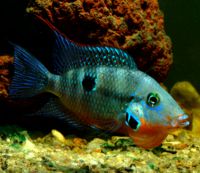Firemouth Cichlid (Thorichthys meeki)
From The Aquarium Wiki
Revision as of 16:24, 10 March 2020 by 170.249.184.46 (talk)
Firemouth Cichlid
Thorichthys meeki
114 Litres (30 US G.)
15.2-16.5cm (6-6.5 ")
Freshwater
6.5 - 8.5
22.2-29.4°C (72 -85 °F)
6-10 °d
1:2 M:F
3-5 years
Family
Cichlidae
This animal is available captive bred
Contents
Additional names
- Firemouth Cichlid
Additional scientific names
- Cichlasoma meeki
Origin[edit]
- Firemouths are naturally found in the slow moving, murky waters in the Yucatán peninsula and as far south as Guatemala.
Sexing[edit]
- Males tend to be more colourful, have a redder throat, more pointed fins and an extended dorsal fin.
Tank compatibility[edit]
- Recommended to be kept in a species only tank or with similar sized Cichlids of the same temperament. These are generally peaceful but males especially can be territorial so are best kept only with robust Cichlid companions or larger robust yet peaceful catfish such as Plecos.
Diet[edit]
- Will take most foods for Cichlids including high quality pellets and flakes, as well as live/frozen food such as bloodworm, brine shrimp and ghost shrimp.
Feeding regime[edit]
- Feed small amounts several times a day.
Environment specifics[edit]
- They are best kept in larger tanks with lots of rocks, plants, and some driftwood with caves for hiding places.
Behaviour[edit]
- Generally a great fish when kept with fish around its same size. The Firemouth can become territorial at times, especially during breeding. When threatened, the Firemouth can flare its gills out similar to the behaviour of a Betta.
Identification[edit]
- A tall and laterally compressed Cichlid. The head is large and pointed. The anal and dorsal fins come to a point. The body colour is light grey to dark slate grey and six to seven, often faint, transverse stripes mark the upper parts. A black spot can be found on the gill cover. The throat and breast are bright red as is the anal fin which also has some iridescent blue spots. The other fins have a red tint with green to blue iridescent spots.
Pictures[edit]
Videos[edit]
| Territorial behaviour towards a human hand: | A pair with fry: |
External links[edit]
- Fishbase (Mirrors:
 )
)



